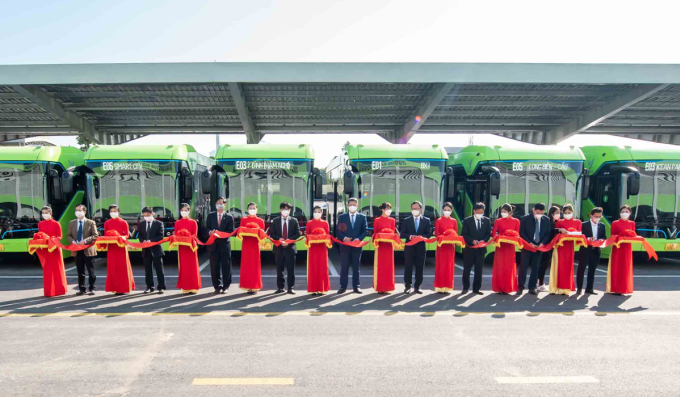HN launches first three battery electric bus lines
VGP – The first battery-electric bus line (E03) was operational from December 2 in Ha Noi, connecting the East and the West (from My Dinh to Ocean Park) with 15 bus stops namely My Dinh (Ham Nghi), Nguyen Hoang, Pham Hung, Khuat Duy Tien, Tran Duy Hung, Nguyen Chi Thanh, Huynh Thuc Khang, Thai Ha, Chua Boc, Pham Ngoc Thach, Dai Co Viet, Tran Khat Chan, Vinh Tuy Bridge, Aeon Mall Long Bien, Co Linh, and Ocean Park.
 |
| The launching of first battery electric bus line in Ha Noi |
On December 2, the second line (E01) connecting My Dinh Station and Ocean Park will be put into operation with 12 bus stops including My Dinh Station, Pham Hung, Khuat Duy Tien, Nguyen Trai, Truong Chinh, Dai La, Minh Khai, Vinh Tuy Bridge, Aeon Mall Long Bien, Co Linh, and Ocean Park.
In the next ten days, the third line (E05) will officially open, connecting Long Bien and Cau Giay Smart City with ten bus stops such as Long Bien, Yen Phu, Thanh Nien, Thuy Khue, Dao Tan, Cau Giay, Xuan Thuy, Pham Hung, Thang Long Boulevard, and Smart City.
On all three routes, there are 48 electric buses, with a frequency of 15-20 minutes each, operating from 5 a.m. to 9 p.m. daily. Ticket price is VND 7,000-9,000, monthly ticket is VND 55,000-200,000. Free-of-charge service is given for the elderly, people with meritorious services, people with disabilities, children under 6 years old, and people from poor households.
An electric bus service was launched in the capital city last April by VinBus Transport Services Limited Company, a subsidiary of Viet Nam's conglomerate Vingroup. The service, the nation’s first smart electric bus service, runs within an urban area of Gia Lam District and will be connected to Ha Noi’s mass transit network soon.
The Ha Noi municipal People’s Committee mapped out measures to put battery electric buses into service during the 2021-2025 period, with a view to encouraging the use of public transport among the locals.
In the first quarter of 2022, Ha Noi will continue to launch two more with one connecting Hao Nam with Ocean Park Urban Area and the other running from Giap Bat to Ocean Park Urban Area.
Four other lines would begin operation in the second quarter of 2022, including the Long Bien-Cua Nam-Smart City, Hanoi administrative building on Vo Chi Cong Street-Times City, Times City-Ho Tay Water Park, and the Smart City-Vincom Long Bien lines.
The budget used to subsidize bus fare for the three lines this year would amount to over VND9 billion (over US$397,000).
Such a pricing scheme would be temporarily applied for 12 months starting from the moment the bus lines come into use.
Earlier, the Ha Noi People’s Committee has mapped out measures to develop public transport, including a plan to put battery-electric buses into service during the 2021-2025 period, with a view to encouraging the use of public transport among the locals and deploying the plan to increase the battery-electric bus fleet.
The city will also reorganize traffic activities, giving priority to buses traveling through areas that are closed to car traffic. Besides, large capacity modes of public transport such as bus-rapid-transit units and the urban railway system will be prioritized.
Furthermore, the city will seek ways to improve public transport services, charge congestion fees, and gradually limit the entry of motorcycles to downtown districts in 2030 to increase the number of public transport users.
The Hanoi Transportation Corporation (Transerco) has proposed that 15-20% of buses operating in the city run on clean energy by 2025.
The proposal, being studied by the municipal Department of Transport, suggests increasing the number of buses in Ha Noi by 90% to 3,400-3,800 by 2025, of which 15-20% operate on electricity and compressed natural gas.
The proposal, which targets to reduce emissions and air pollution in the city, expects over 25% of buses in Hanoi to run on clean energy by 2030.
Towards further development of the public transportation network, Transerco says that the city needs 13 new bus priority lanes with a total length of 60.8 kilometers. Its proposal includes setting up 1,500-2000 bus stops and 30-40 bus terminals in the new bus routes.
Ha Noi currently has 126 routes using vehicles powered by fossil fuel and seven others that use buses fueled by compressed natural gas.
An electric bus service was launched in the capital city last April by VinBus Transport Services Limited Company, a subsidiary of Viet Nam's conglomerate Vingroup. The service, the nation’s first smart electric bus service, runs within an urban area of Gia Lam District and will be connected to Hanoi’s mass transit network soon./.
By Kim Anh

